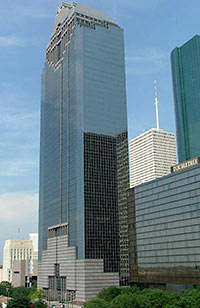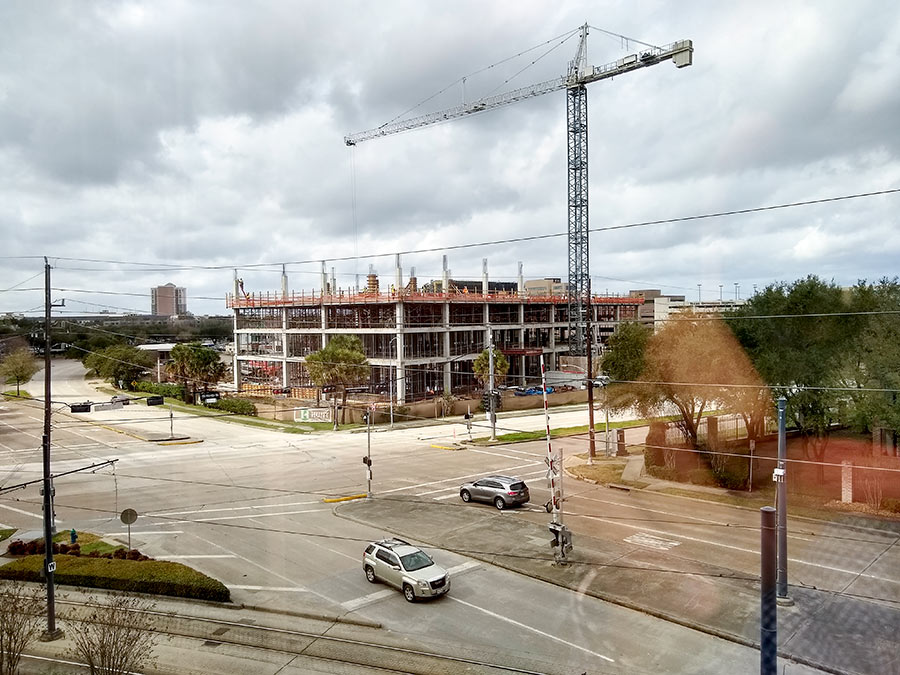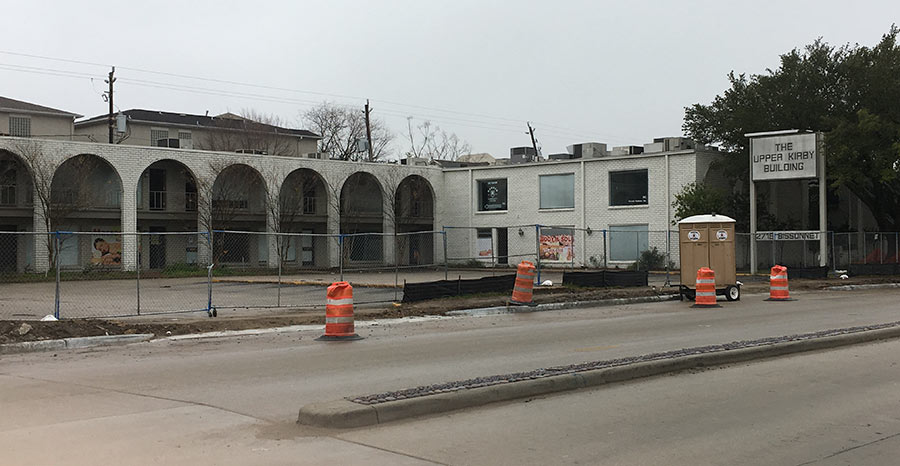THE OFFICE BUILDING APPRAISAL DISCOUNT  “Across the city, prime office buildings are selling for far more than their tax values, leaving billions in potential tax revenue on the table at a time when city and county budgets are stretched,” writes business columnist Loren Steffy. “It’s almost as if there’s two sets of books: one for the buyers and sellers, and one for the tax man. A random sample of more than 40 office buildings that sold in the past five years found 2011 appraisals trailing market value by about 40 percent, or more than $1.6 billion in unrecognized taxable value.” A state law prohibits county appraisers from taking into account certain “intangibles” — including leases and occupancy rates — in valuing commercial property. [Houston Chronicle, via Off the Kuff] Photo of Heritage Plaza: Waymarking
“Across the city, prime office buildings are selling for far more than their tax values, leaving billions in potential tax revenue on the table at a time when city and county budgets are stretched,” writes business columnist Loren Steffy. “It’s almost as if there’s two sets of books: one for the buyers and sellers, and one for the tax man. A random sample of more than 40 office buildings that sold in the past five years found 2011 appraisals trailing market value by about 40 percent, or more than $1.6 billion in unrecognized taxable value.” A state law prohibits county appraisers from taking into account certain “intangibles” — including leases and occupancy rates — in valuing commercial property. [Houston Chronicle, via Off the Kuff] Photo of Heritage Plaza: Waymarking





Isn’t probably the vast majority of every property both residential and commercial in town probably undervalued? If we’re going for pinpoint FMV accuracy, I’d think there’s a lot more potential tax dollars in assigning accurate appraised values to the millions of homes across the county than the handful of skyscrapers.
Please note that I’m not requesting an army of HCAD apprasiers swarm through my neighborhood, just pointing out the potential tax revenues from accurate appraisals of CBD towers probably pales in comparison to the tax revenues from taxes being correctly assessed on every Tom, Dick and Harry across town.
The same thing happens in River Oaks, West U, etc, the homes could not be purchased for anything close the tax value. The higher the price the bigger the delta.
I read this yesterday and thought to myself how convienient that Steffy would leave out the fact that the CAD’s are forbidden by law to take into account leases and occupancy rates when valuing income producing properties. Thats typically included in the sale price of any multi-occupancy property in anticipation of future rent payments. How fair is it to value a building each year on rent payments to be made 10-20 years from now? He’s just trying to sell more papers by screaming “UNFAIR”, “RICH OIL PROFITS”, “FATCATS SCREW THE LITTLE GUY”.
Fact is these office buildings are typically overvalued by HCAD and other large CAD’s using very optimistic Capitalization Rates (Cap Rate= Annual Net Operating Income/ Cost or Value). This year they will probably be lowering the cap rate on Class A properties by at least 1% which represents a huge increase in value. I would love to be the tax consultant this year on Hess Tower (or maybe I wouldn’t)
If commercial real estate were taxed on its FMV, the extra burden would be passed on to companies and consumers. People love to point out the amount of taxes that arent being paid. The reality is, the man in the mirror would ultimately end up paying those costs. Also, taxing property at FMV does not take in to account the crazy financial risk that comes with owning a non liquid asset.
The system IS biased against low-value properties. There’s not a great deal of incentive to even file protest on a $40k mobile home, but there’s plenty of incentive to litigate the value of a downtown highrise in district court; and by that time, the highrise has had three bites at the apple.
I’m not sure that there’s an easy solution to the inequity, though. Mass appraisal is a blunt tool by its very design. The right of protest allows for some of the rough edges to be smoothed out.
Seems to me that inequity in appraised value results in extra burden on homeowners — and if the burden were pushed back to the commercial world, it would not necessarily end up paid by “the man in the mirror.” While I understand ajpeter’s argument, microeconomics 101 (remember what happens to profits of the firm as taxes are raised?) shows that usually, the full cost of taxation cannot be passed on to a firm’s customers, unless there is a monopoly. For commercial property leases in Houston, the NNN, including property tax, is typically passed directly through to tenants in the lease. Therefore, the burden is picked up by tenant businesses. In many cases, particularly if they have no pricing power anyway in the current economy, the cost is fully absorbed by their business. Finally, I would point out that the property owner is largely insulated from tax risk (except for vacancy where there is no tenant to pass on the cost) by the act of passing on NNN to tenants. Therefore, property owners have already de-risked their part of owning their “crazy illiquid asset”. They should not anticipate getting further sympathy.
Assuming that any cost gets passed on to the little guys is simplistic and dumb. Yes, costs get passed on – and in doing so they get spread around a lot and thus are a lot less painful. And there is a strong free market argument that taxes should go where they belong – with the property owner, in this case – so that market forces can determine where those costs get recouped.
But this is Texas, a welfare state for businesses, where we believe in self-reliance from the day you’re born until the day you incorporate.
It’s very true that many buildings, at least in Montrose class C land, are appraised at far less than you could sell them for. Though I do have a few that are higher and I can’t seem to get HCAD to lower them (even after showing I paid less), that’s the exception. And if you don’t protest, they’ll slowly hit FMV and go over — so maybe it balances out.
.
Funny side note: I’ve had properties for sale that were worth much more than hcad and I’ve had people point to the hcad and say “I can’t pay x% more than the hcad value!”. I tell them to look at a low hcad value as a blessing, not a curse. On the flip side, I’ve had people with properties I wanted to buy that were worth less than HCAD and they’ve pointed to a high hcad vlaue as a benifit. I told them “you’re pointing at my tax bill, how is bigger better?”
.
Investors using their own capital in a free market are much better at determining value than the appraisal district (or hell, even most appraisers that are paid to appraise a given property). Drives me crazy that a bank requires an appraiser come out and determine the value of a building I want to buy (after I’ve done my DD) when this person has never bought or operated a mulitfamily building and works out of Spring or Katy so knows nothing of this submarket. I normally try to do all the work for them so when I meet them I hand them all the info they need.